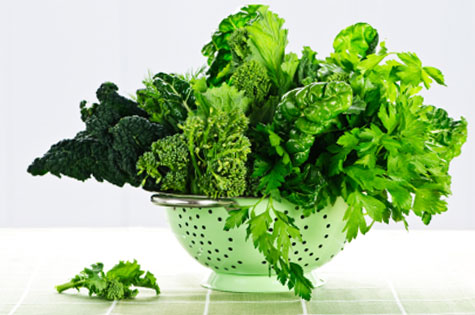
Written By: Sofia Layarda, MPH
Title: Master of Public Health
Alumni: University of California, Berkeley
Last Updated on:

What better way to celebrate St. Patrick’s Day than to spend some time checking out the powerhouse greens of the vegetable world: dark green leafy vegetables. They are such low-calorie carriers of nutrients that it’s a shame we don’t eat them more often. We’ve compared some below to highlight the nutrients they bring to the table.

Table of Contents
Dark green leafy veggies contain lutein, a nutrient that guards against age-related macular degeneration and has a protective effect against heart disease and stroke. The amount of lutein in kale is seven times what you get from an equivalent serving of spinach.
Folate is important in the production and maintenance of new cells; it is one of the most-needed nutrients in infancy and pregnancy. It also plays a role in the prevention of anemia and cancer.
Dark green leafy vegetables are generally high in fat-soluble Vitamin K, which plays an important role in blood clotting. Just for comparison, an equal amount of spinach contains 145 mcg.
We often associate Vitamin C with fruits, but it turns out some of the dark green leafy veggies also contain a respectable amount of this well-known antioxidant.
Vitamin A plays a huge role in vision health, and is also important in bone growth, reproduction and skin health. It also helps the immune system to fight off infections.
While it’s great to stock up on broccoli and spinach, there are so many more types of dark green leafy vegetables out there just waiting to be discovered. Kale, for example, contains mind-boggling amounts of lutein, Vitamin K, and Vitamin A, while dandelion greens provide a reason to look at this common weed in a new light! Note that many of the lesser-known greens have a stronger flavor, some of them bitter, so it is best to quickly blanch them in boiling salted water before preparing them for other dishes.
Alumni: University of California, Berkeley – Sofia believes in bringing back fun and pleasure into everyday eating. She loves cooking, and is constantly experimenting with ingredients, creating recipes and trying them out on family and friends. Her latest interest lies in finding realistic and practical ways of environmentally-friendly food/eating habits.
dandelion greens, folate, kale, leafy greens, lutein, mustard greens, spinach, turnip greens, vitamin a, vitamin c, vitamin k